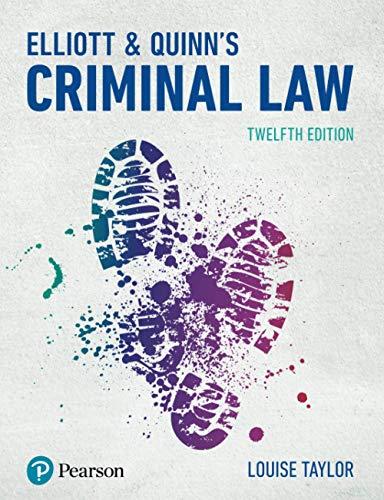Question
04 I NEED A GOOD AND DETAIL ANSWER TO EACH QUESTION PLEASE 27-5. Section 1 of the Sherman Act. The National Collegiate Athletic Association (NCAA)
04 I NEED A GOOD AND DETAIL ANSWER TO EACH QUESTION PLEASE
27-5. Section 1 of the Sherman Act.
The National Collegiate Athletic Association (NCAA) and the National Federation of State High School Associations (NFHS) set a new standard for non-wood baseball bats. Their goal was to ensure that aluminum and composite bats performed like wood bats in order to enhance player safety and reduce technology-driven home runs and other big hits. Marucci Sports, LLC, makes non-wood bats. Under the new standard, four of Marucci's eleven products were decertified for use in high school and collegiate games. Marucci filed suit against the NCAA and the NFHS under Section 1 of the Sherman Act. At trial, Marucci's evidence focused on injury to its own business. Did the NCAA and NFHS's standard restrain trade in violation of the Sherman Act? Explain. [Marucci Sports, LLC v. National Collegiate Athletic Association, 751 F.3d 368 (5th Cir. 2014)] (See Section 1 of the Sherman Act.)
28-1. Registration Requirements.
Estrada Hermanos, Inc., a corporation incorporated and doing business in Florida, decides to sell $1 million worth of its common stock to the public. The stock will be sold only within the state of Florida. Jos Estrada, the chair of the board, says the offering need not be registered with the Securities and Exchange Commission. His brother, Gustavo, disagrees. Who is right? Explain. (See The Securities Act of 1933.)
28-3. Insider Trading.
David Gain was the chief executive officer (CEO) of Forest Media Corporation, which became interested in acquiring RS Communications, Inc. To initiate negotiations, Gain met with RS's CEO, Gill Raz, on Friday, July 12. Two days later, Gain phoned his brother Mark, who bought 3,800 shares of RS stock on the following Monday. Mark discussed the deal with their father, Jordan, who bought 20,000 RS shares on Thursday. On July 25, the day before the RS bid was due, Gain phoned his parents' home, and Mark bought another 3,200 RS shares. The same routine was followed over the next few days, with Gain periodically phoning Mark or Jordan, both of whom continued to buy RS shares. Forest's bid was refused, but on August 5, RS announced its merger with another company. The price of RS stock rose 30 percent, increasing the value of Mark's and Jordan's shares by $664,024 and $412,875, respectively. Did Gain engage in insider trading? What is required to impose sanctions for this offense? Could a court hold Gain liable? Why or why not? (See The Securities Exchange Act of 1934.)
REFERENCES: Cross, F., Miller, R. L. (2016). West's Legal Environment of Business (11a edition). Editor. Mason, OH: Cengage.
Step by Step Solution
There are 3 Steps involved in it
Step: 1

Get Instant Access to Expert-Tailored Solutions
See step-by-step solutions with expert insights and AI powered tools for academic success
Step: 2

Step: 3

Ace Your Homework with AI
Get the answers you need in no time with our AI-driven, step-by-step assistance
Get Started


